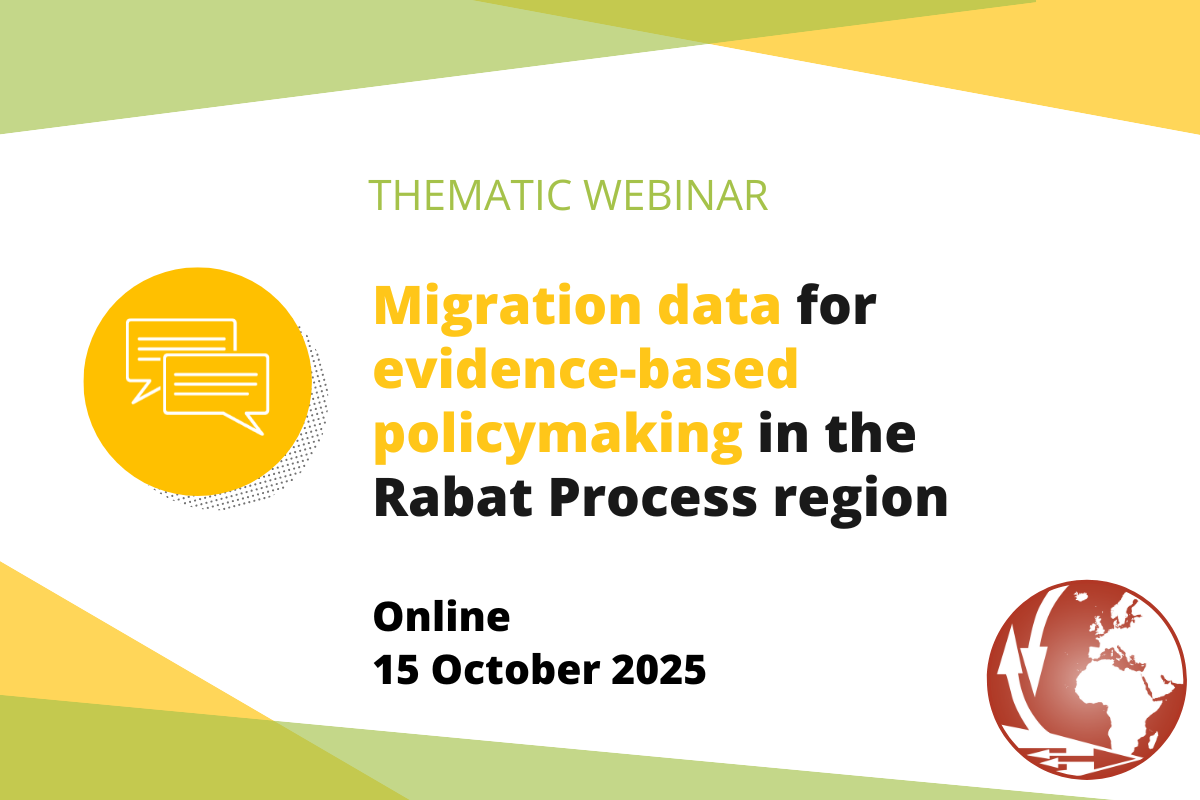On Wednesday 15th October 2025, the Rabat Process hosted a Thematic Webinar on migration data – a landmark event dedicated to harnessing evidence for more effective policymaking across the Dialogue’s region.
As the first webinar under the Cadiz Action Plan entirely dedicated to migration data, it marks an important step in advancing regional collaboration.
Organised under the Nigerian Chairmanship of the Rabat Process, this Thematic Webinar brought together over 70 participants, from 13 European and 16 African partner countries, along with leading experts from key national, regional and international organisations. Officials and experts from National Statistical Offices and migration observatories were also specially invited to contribute their expertise and enrich the discussion.
Building on Area 1 of the Cadiz Action Plan - particularly Objective 2 and Action 4 – the webinar emphasised good practices in data collection and analysis, and explored practical ways to integrate migration data into policymaking. Discussions covered recent changes in migration data standards, highlighted the role of migration observatories and statistical offices, and charted pathways for migration data beyond 2030.
The webinar offered a valuable platform to advance a shared vision for stronger migration data systems, highlighting the crucial contribution of regional and national migration observatories and institutions in improving migration policymaking in the Rabat Process region.
Key takeaways
The discussions underscored several key insights:
-
Data-driven migration governance is essential: Reliable, timely, and harmonised data underpins effective policymaking, enabling countries to understand migration patterns, respond to trends, and ensure migration contributes to economic growth, social inclusion, and human rights. Whole-of-government and whole-of-route approaches are crucial.
-
Observatories and coordination mechanisms matter: National and regional migration observatories, such as in Nigeria, Cabo Verde and Tunisia, play a pivotal role in harmonising methodologies, consolidating data, and linking research to policy. Regional coordination via RECs and platforms like AMO, Statafric, and Statistics Sweden supports standardisation and capacity building.
-
Harmonisation and partnerships strengthen impact: Initiatives like the JVAP FU, Statistics Sweden’s continental projects, and ongoing work under the AU and Statafric demonstrate the value of coordinated action, shared definitions, and consistent data collection. Harmonisation efforts improve comparability, enhance evidence-based policymaking, and promote cross-regional learning.
-
Challenges persist: Key challenges include inconsistent definitions, limited resources, administrative data gaps, and underrepresentation of civil society and private sector perspectives. Innovative solutions and stronger engagement with all stakeholders are needed to maximise the utility of migration data.
Recommendations for Rabat Process partner countries
Building on these takeaways, the webinar outlined actionable steps for partner countries to strengthen migration data systems and translate insights into effective policies:
-
Strengthen national migration data systems: Establish or reinforce migration observatories, adopt harmonised data collection tools, and promote inter-agency coordination to ensure consistent, high-quality, and disaggregated data.
-
Enhance regional and continental collaboration: Engage actively with platforms such as the AMO, Statafric, Statistics Sweden, and the African Migration Data Network to harmonise methodologies, share good practices, and align with continental guidelines.
-
Promote inclusive participation and knowledge sharing: Ensure civil society, academia, and private sector voices are included in data discussions, leveraging local expertise and operational insights to complement technical and policy-level perspectives.
-
Invest in capacity development and innovation: Build technical skills for data collection, analysis, and visualization, and explore innovative data sources and tools to strengthen evidence-based policymaking.
-
Use data for action and accountability: Translate collected data into actionable policies, monitoring mechanisms, and evidence-based interventions, ensuring migration governance remains transparent, inclusive, and responsive to vulnerable groups.
-
Sustain long-term funding and institutionalisation: Secure dedicated resources for national and regional observatories and harmonisation initiatives to maintain continuity, improve data quality, and institutionalise evidence-based practices.
The webinar fostered peer learning, collaboration, and reflection, laying the groundwork for future activities within the Dialogue.
More details in the Outcome document.






